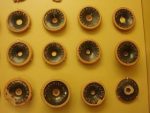 The last week of our first unit – time to wrap up, round off, finish up any work not yet done and to perhaps get a preliminary taste of what’s to come in future units. Easter holidays are just around the corner. Our youngest students are having a final discussion about celebrations; slightly older students are finishing off their quest for Aunt Madge, by looking at landmarks and the older students are considering democracy in Australia, compared to its early beginnings in Ancient Greece.
The last week of our first unit – time to wrap up, round off, finish up any work not yet done and to perhaps get a preliminary taste of what’s to come in future units. Easter holidays are just around the corner. Our youngest students are having a final discussion about celebrations; slightly older students are finishing off their quest for Aunt Madge, by looking at landmarks and the older students are considering democracy in Australia, compared to its early beginnings in Ancient Greece.
Foundation to Year 3
Foundation/Prep (units F.1 and F.6) students are finishing off their discussions about celebrations, just in time for the Easter holidays, by looking at celebrations around the world. Teachers may wish to focus on how other countries celebrate Easter, with passion plays, processions and special meals. Students in Years 1 (unit 1.1), 2 (unit 2.1) and 3 (unit 3.1) are finishing off their Aunt Madge activity, looking at landmarks in Australia and around the world. There is the option for teachers to concentrate on Australian landmarks in this lesson, setting the stage for some local history studies in the next unit, next term.
Years 3 to 6

Older students in Years 3 (unit 3.5), 4 (unit 4.1), 5 (unit 5.1) and 6 (unit 6.1) start looking ahead and laying the foundations for later studies on the Australian system of government and democracy, by comparing democracy as it arose in Ancient Greece, with the modern Australian democratic system. Our word for democracy comes from the Ancient Greek words demos (people) and kratia (power). Students move on from their discussion of Eratosthenes to looking at the Ancient Greek democratic system, which was to lay the groundwork for modern democratic systems around the world. Discussing Ancient Greek democracy leads students to consider the rights and responsibilities of being a citizen, at both the local and international levels. Students also consider who could and could not vote and what this meant for different groups. They can also touch on the ancient practise of ostracism, which can lead to ethical debates around fair election practises. By considering these fundamental concepts, students are better able to relate the ideas around modern democracy to their own lives.


The kit was easy while still fun to build (except maybe for fitting the wires in). This was a fun…
Florence (15) and Keito (14), students at Hakusan International School